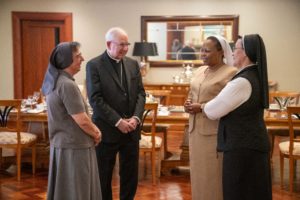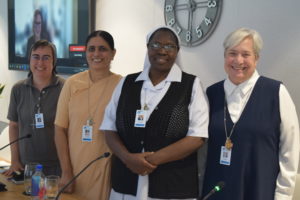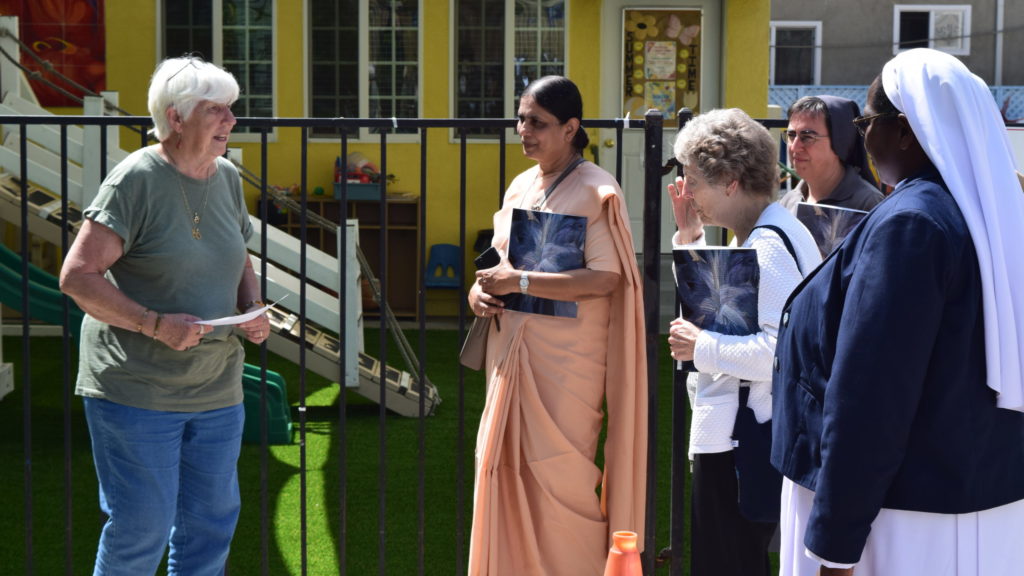Before his death in 1979, hotel magnate Conrad Hilton left behind two key instructions for the future of his charitable foundation: that aid be given to Catholic sisters, and that it be given with no “territorial restrictions.”
Forty-five years later, that mandate still guided discussions at an Aug. 25-29 gathering in Los Angeles with leading religious sisters convened by the Catholic Sisters Initiative, where board members and staff were updated on its work supporting Catholic sisters ministering to the poor around the world.
During the meetings, four visiting sisters from Kenya, India, the Vatican, and Texas offered a “complete picture” of what the initiative, which gives away nearly $50 million in grants a year, is accomplishing.
But just as valuable, the sisters found, were the opportunities to simply talk to one another.

“What surprised me is that although we come from different parts of the world, we’re facing the same challenges,” said Sister Alessandra Smerilli, an Italian who serves as the number two official at the Vatican’s Dicastery for Promoting Integral Human Development.
For example, Smerilli and her fellow panelists heard about how the initiative is helping efforts to care for LA’s aging population of sisters. Smerilli and fellow panelist Sister Nirmala Nazareth, who oversees more than 130,000 sisters in her role as president of India’s Conference of Religious Women, shared how they are facing a similar crisis in their own countries.
“As the population of sisters becomes more elderly, they need more assistance, and you need to be prepared from a financial point of view, too,” said Smerilli, an economist who is also a professor at a university in Rome.
From behind her desk at the Vatican, Smerilli sees daily evidence of how the foundation has emerged as a lifeline for work overseen by women religious in some of the world’s most unstable and impoverished places, including anti-human trafficking efforts, providing health care for migrants from war-torn areas, and helping young people learn job skills.
During a visit to Alexandria House, a transitional group home in LA’s Koreatown for homeless women and children founded by Sister Judy Vaughan in 1996, Smerilli was surprised to learn that it relies on donations, rather than public money, to help the poor in a place like Los Angeles.
“I had a perception that since in the U.S. everything is so well organized, someone has to take care of the poorest,” said Smerilli, one of three religious sisters appointed to high-ranking Vatican positions by Pope Francis in recent years.
The other two panelists who traveled to LA for the meetings were Sister Josephine Kangogo, chair of the Association of Sisterhoods of Kenya, and Sister Norma Pimentel, known for her work with migrants as executive director of Catholic Charities of the Rio Grande Valley.
According to Sabrina Wong, senior program officer for the Catholic Sisters Initiative, Pimentel “brought down the house” during a presentation on the work of Catholic sisters along the U.S.-Mexico border in South Texas.
“There was not a dry eye in the room,” as Pimentel was speaking, said Wong, who helped organize the sisters’ visit to Los Angeles.

The initiative has awarded grants to the Sisters Border Network, which helps agencies like Pimentel’s share resources and coordinate efforts to receive migrant families on both sides of the U.S.-Mexico border. In Los Angeles, three years ago the initiative announced a grant of nearly $200,000 toward a landscape study of religious life in the archdiocese, which includes an updated database of local sisters.
The delegation of sisters was also given a presentation by Sister Mary Sean Hodges about the Partnership for Re-entry Program (PREP), which she founded in Los Angeles more than two decades ago to provide inmates serving life sentences with mentoring and personal growth courses. Like Alexandria House, PREP has received grants from the Hilton Foundation to expand their “comprehensive services,” including job training and mentoring for former inmates looking for a new start.
The Hilton Foundation was started in 1944 by Conrad Hilton with the intention to “relieve the suffering, the distressed, and the destitute.” A devout Catholic with a special affinity for the work of Catholic sisters, the fortune Hilton left behind led the foundation in 1986 to start the Hilton Fund for Sisters, which supports the work of women religious with underserved populations around the world.
Meanwhile, the Catholic Sisters Initiative, started in 2013, supports sisters’ education, leadership and care, and networks of sisters that work together to help those underserved populations achieve self-sufficiency.
The initiative’s support is even being felt in the Vatican, where Smerilli worked with the foundation to develop a network of more than 500 sisters working with migrants around the world, providing training while connecting them to one another and national bishops’ conferences. During a recent trip to Zambia, Smerilli discovered that the country’s bishops had put one of those sisters in charge of pastoral care for migrants.
“We’re trying to build those networks because we feel that the work of the sisters is so precious,” said Smerilli. “They need to be better recognized in order to better serve the poor.”
For Wong, watching the visiting nuns interact with one another and with the people they met in LA was “like a master class in how to be a better human being.”
It was especially important, she believes, for newer Hilton Foundation staff to see the people they support up close.
“It shows a true picture of who they are,” said Wong. “Not just sweet women who pray, but people who are at the forefront of sustainable human development, leading others on a global scale. It’s really important for them to be acknowledged.”

